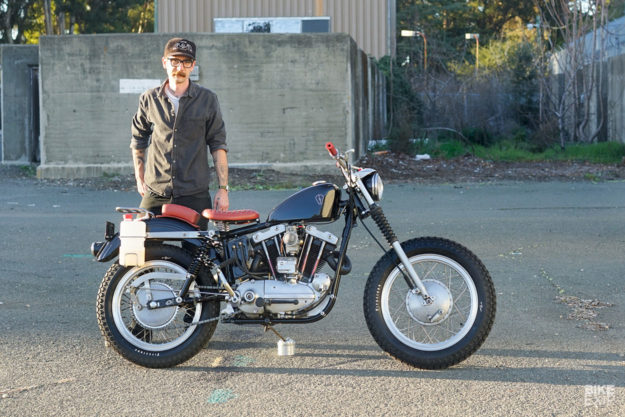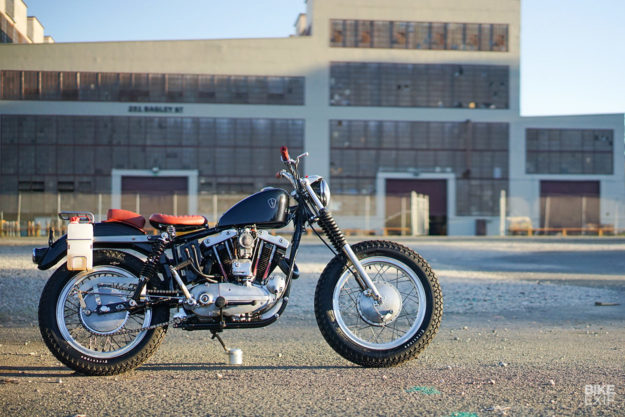
Jared Smith has a pretty diverse skill set. He has one foot in the digital world as a user experience and software designer, and the other in the analog realm as a custom bike builder. And he does it all under one banner: Blue Jack Studio.
“What gets me up in the morning is designing and creating anything,” he says, “whether physical or digital.” From his converted single garage in Vallejo, California, Jared builds a bike or two a year. This mid-60s Harley-Davidson XLCH Sportster is his fifth build, and it’s a real peach.
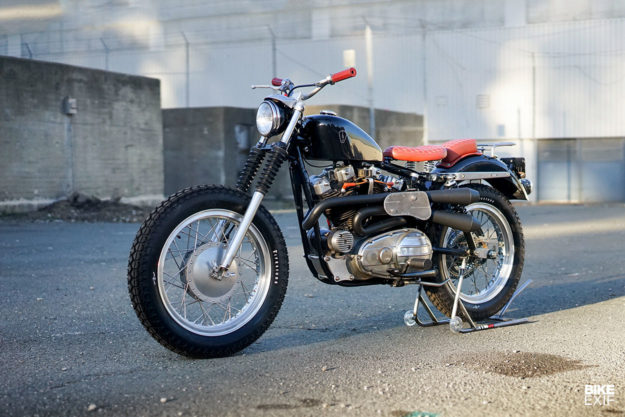
Jared first got interested in building motorcycles about six years ago. Since then, he’s collected an array of vintage metalworking tools—and taught himself to use them too.
“I’ve been lucky to meet several very skilled motorcycle builders and fabricators in The Bay Area,” he tells us, “that have been kind enough to help me along the way and teach me what they know.”
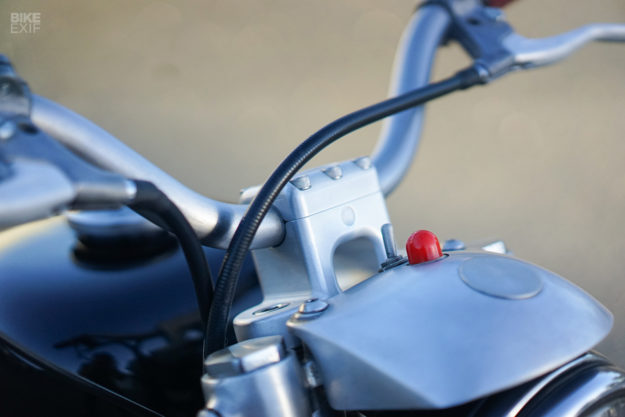
“There were many trips over the last few years to Jasin Phares from Phares Cycle Parts (now based out of Kansas) to ask how to get the weld just right, or to shape a piece of sheet metal, or how to hold a complicated part to mill it, or just to borrow a tool I didn’t own yet.”
Jared’s goal with the XLCH was to find a balance—between old parts that would show their age, and handmade touches. “I wanted to build something that still looked (from a distance) like a stock 60s Sportster,” he says, “but on closer inspection, and more importantly when riding, felt a far cry from that.”
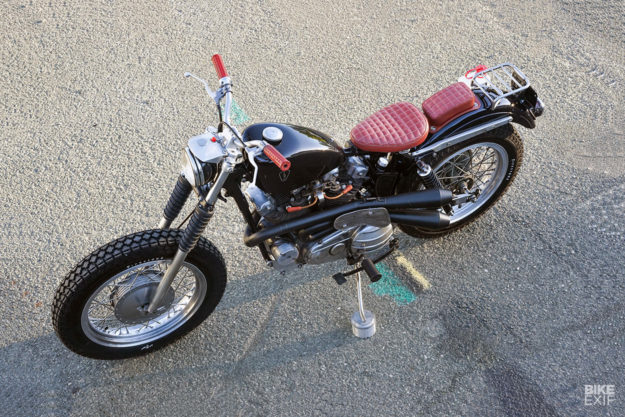
“It’s a 1966 XLCH Sportster, which is a favorite platform for me to build around at this point. I just love these simple, battery-less, magneto-fired, right side shift motors so much.”
When Jared got the bike it had been parked for almost twenty years, after an abandoned attempt at customization. Once he’d rebuilt the oil pump and thrown in a set of PB+ cams, the motor was good to go.
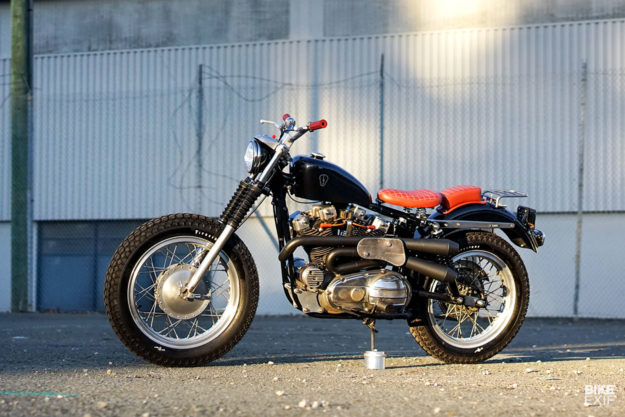
The frame needed a little more love. It was covered in Bondo and spray paint, plus it was missing its rear shock mounts and fender strut castings. Jared reckons the previous owner was planning to hardtail it, but that wasn’t the plan here.
With a little luck, he managed to source original mounts and castings. So he blasted the frame back to raw, made a jig to hold everything in place, and welded them in.
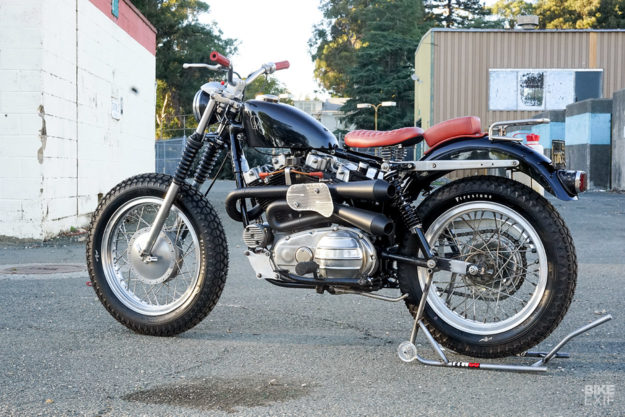
The new tank and rear fender are reproduction items, made by V-Twin Manufacturing, and painted by Jay Abate. For the seat, Jared hit up Wes at Counter Balance Cycles, with a dead simple brief. “The only direction I gave him was to make them look like they could be the pilot’s seat in a B2 stealth bomber,” quips Jared. “He killed it with the narrow Bates-style pair.”
The exhaust is custom too; Jared pieced it together using Cone Engineering parts, running it on the left as a nod to the legendary XR750. He then had it finished in black Cerakote, and fabbed up a stainless steel heat shield to cap it off.
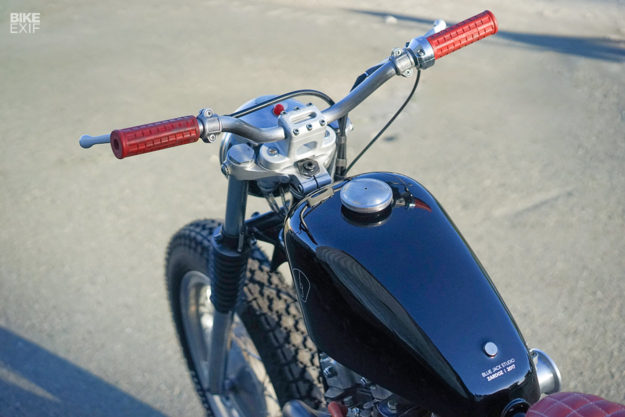
This old Sporty’s also loaded with some neat personal touches. That six-bolt bar riser setup is Jared’s own design (he sells both 7/8” and 1” versions of it), and the narrow, high-rise bars are hand made one-offs.
The Harley’s suspension has been upgraded, courtesy of Ikon Suspension. They set Jared up with a set of 3” longer-than-stock rear shocks, and a rebuilt stock front end. Keeping things period correct are a set of OEM 19F/18R high-shoulder rims, wrapped in Firestone ANS rubber.
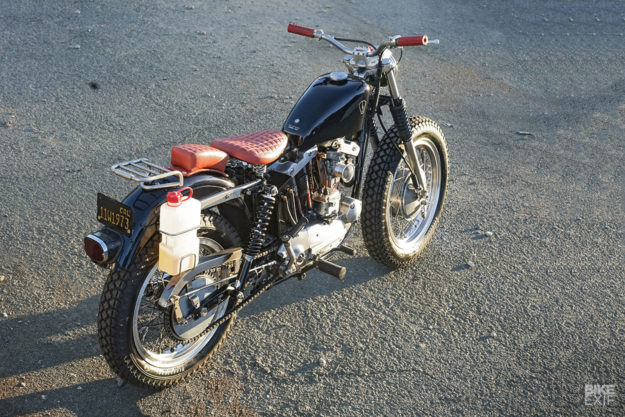
At the back, Jared built a luggage rack and a small carrier for an extra fuel bottle—both from stainless steel. Other custom bits include the oil bottle and cap, a front brake adjuster on the fork lower, and a small guide for the spark plug leads.
But the most interesting (and outlandish) parts are the new Pyrex pushrod covers. Yes…Pyrex. Jared says they’re a proof of concept, and hopes to reproduce them for modern Sportsters.
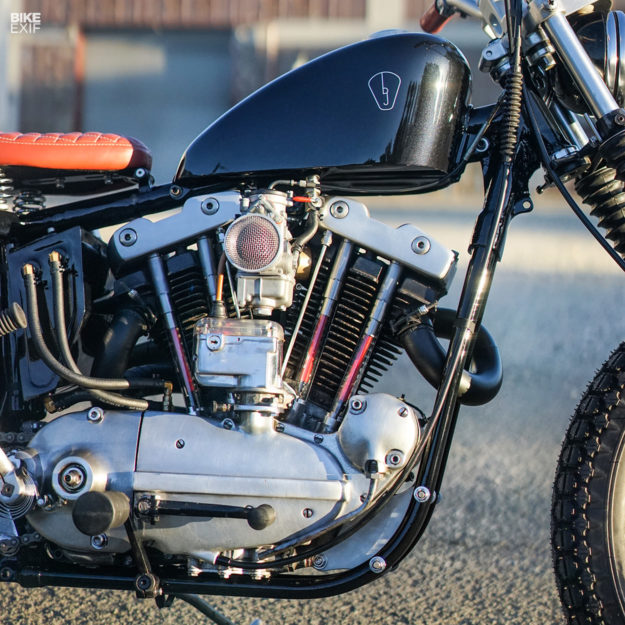
“It’s an idea I’ve had for a while, and I finally found a Pyrex manufacturer that could machine the sizes I need. The uppers were custom made here in-house from 4130 Chromoly. All told they took about 30 to 40 hours of design and 20 hours of fabrication to produce on my manual lathe.”
He spent countless hours on planning, checking clearances, testing durability, and just generally making sure they wouldn’t explode the first time he fired the bike up. “So far so good on that,” he says, “and they look epic when the bike is running and you can watch the tappets flying up and down.”
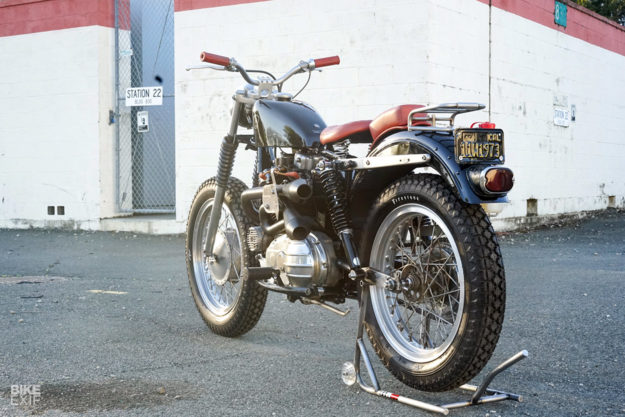
“The pyrex is really tough, with a 0.120″ wall, and has a softening point of 1,500 degrees Fahrenheit. It would take quite a hit from a rock to do any damage to them.”
Jared’s nicknamed the Sportster ‘Zardoz.’ But it’s way cooler than Sean Connery in a futuristic man-kini. It’s an uncomplicated build with zero pretense, but we do have one gripe: any bike with glass pushrod covers deserves a video of it running!
Facebook | Instagram | Images by Jared Smith
